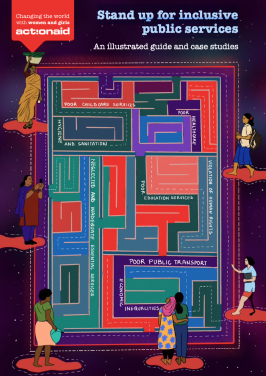Stand up for inclusive public services
To achieve gender equality and to end violence against women, women and girls need quality, gender-responsive public services that meet their needs.
Such services can go a long way in meeting basic needs, improving access to justice, promoting economic rights and protecting bodily integrity. However, the provision of public services continues to face serious challenges including their ongoing privatisation of services and financial cutbacks.
Executive summary
Gender-Responsive Public Services are critical for advancing women’s rights. However, the provision of public services continues to face serious challenges including their ongoing privatisation of services and financial cutbacks.
Developed through a participative process with the Young Urban Women teams in South Africa, Kenya, Ghana and Malawi, this illustrated guide on Gender-Responsive Public Services (GRPS) sets out how women and girls’ rights are impacted when public services are poor quality, privatised or cut, particularly in situations such as the current intersecting crises – inequality, climate, health, education, conflict and debt – alongside the Covid-19 pandemic. It also highlights how the policies and approaches pushed by international financial institutions (IFIs) such as the IMF and World Bank are undermining access.
Through a number of case studies that mix fiction with compelling facts and stats, this guide covers five critical public services: water, transport, education, services to address gender-based violence (GBV), and health. It has been created to support knowledge-building and advocacy of movements of young women to demand their rights from their governments and IFIs.
This guide is for anyone who is interested in and committed to making public services work for women and girls, including Women’s Rights Organisations (WROs), other non-governmental Organisations (NGOs), social justice activists, movements and policy makers.
You can also download our overarching recommendations to policymakers and other stakeholders.
Stand up for inclusive public services guide
Recommendations to improve gender-responsive public services
